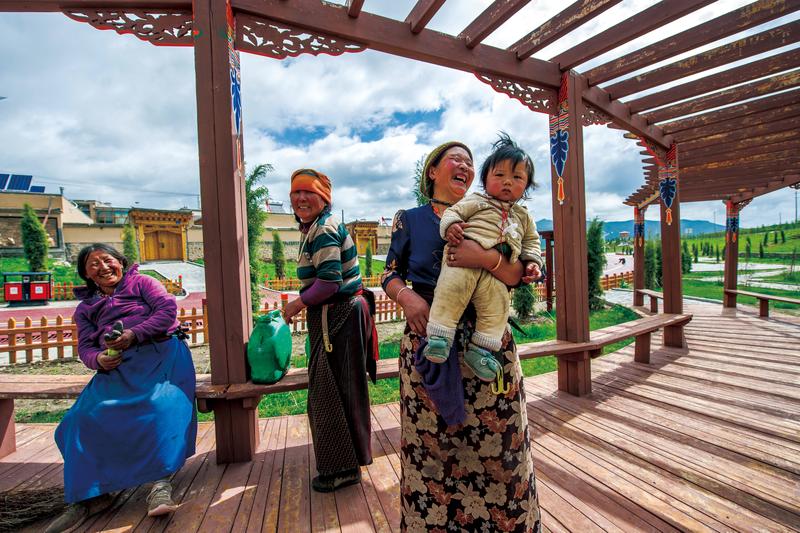 Tibetan residents of Anguo village in Xiahe county, Gansu province, relax on a public green in June. (CAO TONG / FOR CHINA DAILY)
Tibetan residents of Anguo village in Xiahe county, Gansu province, relax on a public green in June. (CAO TONG / FOR CHINA DAILY)
At the latest Vision China event on Thursday, a panel of global observers endorsed the central role played by the Communist Party of China in eradicating domestic poverty and said the benefits can ripple across borders as the world races to reach the United Nations' no-poverty goal by 2030.
Beate Trankmann, the resident representative of the United Nations Development Programme in China, said the zero-poverty milestone was achieved through the Party's "targeted, bottom-up approach", which serves as a valuable example for other nations.
The 750 million Chinese who were rid of absolute poverty over the past four decades made up roughly three-quarters of the global total who left poverty behind during that period, a significant accomplishment in efforts to end poverty globally, she said in a video speech while addressing the event, held by China Daily.
The theme of the event was "Way Forward after Beating Poverty".
She said that the UN's development agency is working to promote the nation's poverty-curbing expertise.
Less than a month ago, President Xi Jinping declared complete success in China's protracted, arduous battle to eliminate extreme poverty-a benchmark requirement in China's effort to build a "moderately prosperous society in all respects" before the Party's centenary this year.
That achieved, the Party has embarked on a new journey to build China into a modern socialist country.
"By continuing to apply the same level of resolve as it has in eradicating extreme rural poverty, China can ... continue to contribute to sustainable development globally," Trankmann said.
While addressing the event, Zhou Shuchun, publisher and editor-in-chief of China Daily, said that poverty is a "worldwide, centuries-old problem that has plagued mankind since the beginning of history".
"The Chinese experience contributes to the world's wisdom, knowledge and solutions for establishing a new paradigm of poverty reduction," Zhou said.
China recently unveiled its 14th Five-Year Plan (2021-25), a blueprint for development priorities. Zhou said China will boost the coordinated development of urban and rural areas and realize a smooth transition from poverty alleviation to rural vitalization during the period.
He also said that China will work hard with other countries to build a community with a shared future for mankind and to establish a more resilient, open and inclusive world economy in an effort to create a clean, beautiful world with lasting peace, universal security and common prosperity.
Robert Lawrence Kuhn, chairman of the Kuhn Foundation, said China's success in bringing the COVID-19 outbreak under control and ending extreme poverty was based on three principles-CPC leadership, General Secretary Xi Jinping's commitment and CPC mobilization.
Kuhn, winner of the China Reform Friendship Medal, said he has told stories of China for more than three decades and has shared his observations about China's antipoverty endeavors."China's poverty alleviation is the best story to undermine biases and disrupt stereotypes about China," he said.
"Just as future historians may well look upon China's fight against the coronavirus as a turning point in worldwide efforts to contain outbreaks of novel diseases, future historians may well recognize China's fight against poverty as a turning point in worldwide efforts to eradicate extreme poverty," he added.
 Farmers drive reaping machines to harvest rice in Fengzhuang village, Taizhou, Jiangsu province, in 2019. (XUE CHUNFENG / FOR CHINA DAILY)
Farmers drive reaping machines to harvest rice in Fengzhuang village, Taizhou, Jiangsu province, in 2019. (XUE CHUNFENG / FOR CHINA DAILY)
Fulfilling intl responsibility
Wang Xingzui, executive vice-president of the China Foundation for Poverty Alleviation, talked about its efforts to fulfill six of the goals in the UN 2030 Agenda for Sustainable Development-no poverty, no hunger, good health and well-being, quality education, clean water and sanitation, and decent work and economic growth.
He shared stories about the beneficiaries of some of its signature overseas programs and said China is fulfilling its "due international responsibility". The programs collectively have benefited more than 1.3 million people in 24 countries and have increased people-to-people connectivity, he said.
Wang said it will continue implementing domestic development programs with nongovernmental resources to consolidate poverty reduction achievements and facilitate the national rural vitalization strategy.
David Monyae, director of the Centre for Africa-China Studies at the University of Johannesburg in South Africa, spoke highly of China's development achievements, saying it has emerged as one of the most critical players in the international arena.
"Africa has so much to learn from China on how to uplift the majority of Africans from poverty," he said.
"The CPC has taken another Long March, this one toward prosperity and global acclaim."
Monyae noted that going from a poor country to its current status as the second-largest global economy, China's achievements merit respect. "The CPC has blazed a trail that no other nation has. Of most importance, its achievements inspire hope in the developing world," he said.
As a China Daily reporter, Erik Nilsson has spent 15 years exploring poverty alleviation in remote areas in every provincial-level region on the Chinese mainland.
A Chinese Government Friendship Award laureate, he shared his experience as a reporter in the earthquake-ravaged cities of Wenchuan, Sichuan province, and Yushu, Qinghai province. Wenchuan was hit by a magnitude 8 quake in 2008, and Yushu endured a magnitude 7.1 temblor in 2010.
He said China has been the main driver of global poverty alleviation. "I expect China's development will continue to accelerate to advance virtually every dimension of human well-being, not only within China but also the world."
Vision China was launched in 2018 and serves as a major podium for promoting China's voices via the media group's position as a globalized, all-media platform that features multilingual and multichannel distribution.
Seventeen previous Vision China events have been held in cities including Beijing, Tianjin, Macao, Hangzhou in Zhejiang province and Lanzhou in Gansu province as well as in New York, London and Johannesburg.
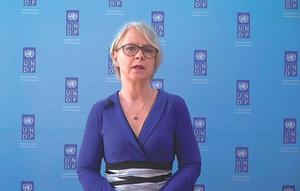 Beate Trankmann, the resident representative of the United Nations Development Programme in China, delivers a video speech during Thursday's Vision China event. (PHOTO PROVIDED TO CHINA DAILY)
Beate Trankmann, the resident representative of the United Nations Development Programme in China, delivers a video speech during Thursday's Vision China event. (PHOTO PROVIDED TO CHINA DAILY)
Balancing objectives is key to progress
By Hou Liqiang
![]()
By continuing to apply the same level of resolve as it has in eradicating extreme rural poverty, China can not only build upon the remarkable progress already made nationally, but also continue to contribute to sustainable development globally, a UN official said.
Beate Trankmann, the resident representative of the United Nations Development Programme in China, said the 750 million people lifted out of poverty over the past four decades represented around three-quarters of the global figure for that period.
This is "a major step toward ending poverty globally" and has offered valuable experiences for other nations, she said in a video speech aired during Thursday's Vision China virtual event, themed "Way Forward after Beating Poverty".
"China achieved this remarkable milestone through its bottom-up, targeted approach," she said. "This involved analyzing local conditions of different counties and villages, to design tailor-made responses for their specific needs.
It also made a long-term commitment to ending poverty in its policies, finances and human resources."
The UNDP has shared the nation's experiences by helping set up the International Poverty Reduction Center in China in 2005. The center is a global knowledge hub that has trained many officials from developing countries in how to reduce poverty, Trankmann said.
She said the UN's development agency also works with China and partner countries to maximize the benefits of South-South Cooperation, which offers a global platform for other countries to gain from China's poverty-fighting experience via knowledge-sharing and technology transfers.
Trankmann also warned of the challenges ahead to safeguard the achievements China has made.
"The tireless work on poverty everywhere is never truly done; it is vital to protect past progress, so those who have risen out of poverty do not slide back," she noted.
COVID-19 has shown just how easily progress can be reversed. Globally, 124 million people are estimated to have fallen into extreme poverty last year during the pandemic, she said.
"This shows how vulnerable those just above the poverty line remain in times of crisis."
As such, welfare systems must protect everyone. In China, this includes migrant and informal workers, who are often not covered by social security or basic public services in the cities that rely on them to function, she said.
While new policies are helping to address this-such as opening urban schools to migrant children-it's important to continue widening social benefits and services, until everyone and everywhere is included, she said. This will be crucial for China to transition to fighting relative poverty, which emphases inequality and highlights situations where people cannot access the same opportunities, services, or experiences that most others can.
"This is critical, given that China is a vast country where economic realities and living costs vary between regions," Trankmann said. She also stressed the importance of a livable planet in ending poverty, saying 40 percent of all jobs depend on the Earth's environment being intact.
This applies in particular to jobs in the agricultural sector in China, which accounts for 25 percent of the country's employment.
"Finding the balance between protecting the environment, economy and society will be key to achieving the sustainable development goals in China," she said.
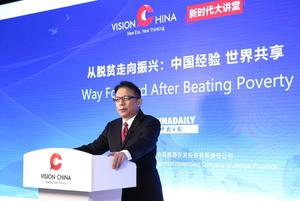 Zhou Shuchun, China Daily publisher and editor-in-chief, delivers a speech during the Vision China event. (ZOU HONG / CHINA DAILY)
Zhou Shuchun, China Daily publisher and editor-in-chief, delivers a speech during the Vision China event. (ZOU HONG / CHINA DAILY)
Cooperation necessary for global prosperity
By Zhao Xinying
![]()
China sees sustained, high-quality development as something that will benefit people nationwide and globally, and the country is calling for more solidarity and cooperation against the backdrop of the global COVID-19 pandemic and a declining world economy, Zhou Shuchun, publisher and editor-in-chief of China Daily, said on Thursday.
The nation will boost the coordinated development of urban and rural areas and realize a smooth transition from poverty alleviation to rural vitalization during the 14th Five-Year Plan period (2021-25), he said.
Additionally, China has pledged to work hard with other countries to build a more resilient, open and inclusive global economy in an effort to create a clean, beautiful world with lasting peace, universal security and common prosperity, he added. Zhou made the remarks while addressing the Vision China event themed "Way Forward after Beating Poverty", which was hosted by China Daily.
What lies ahead in a "post-poverty era" as China embarks on a new journey to build a modern, socialist nation? And what can the world do to reduce poverty most effectively when COVID-19 has made it even more challenging?
Zhou said these are the questions that people at China Daily had in mind when launching the event."Poverty is a worldwide, centuries-old problem that has plagued mankind since the beginning of history," he noted.
Less than a month ago, President Xi Jinping declared complete success in China's protracted, arduous battle to eliminate extreme poverty, which had troubled the nation for thousands of years. Over the past 40 years, the number of people China has lifted out of poverty accounts for 70 percent of the world's total, he said.
In a congratulatory message, Antonio Guterres, the UN secretary-general, said the nation's extraordinary achievement is a reason for hope and inspiration to the global community.
Citing Guterres, Zhou said the Chinese experience contributes to the world's wisdom, knowledge and solutions for establishing a new paradigm for poverty reduction. Zhou also said considering the current state of the world, which is battling a raging pandemic and a declining global economy, it's necessary for all countries to build consensus and work together.
"Despite diverse interests and beliefs, countries have more in common than that which divides us," he said. "That is why China will, as always, persevere to seek a win-win scenario for the handling of international relations and push for the building of a community with a shared future for mankind."
 Fishermen return after harvesting sea produce in Fuzhou, Fujian province, in 2017. (GUO JIANGTAO / FOR CHINA DAILY)
Fishermen return after harvesting sea produce in Fuzhou, Fujian province, in 2017. (GUO JIANGTAO / FOR CHINA DAILY)
CPC at center of 'epic achievement'
By Zhao Xinying
![]()
Having lifted hundreds of millions of people out of poverty, China's poverty alleviation has been an "epic achievement" and the leadership and organizational capacity of the Communist Party of China has played a key role during the process, an expert said on Thursday.
"Just as future historians may well look upon China's fight against the coronavirus as a turning point in worldwide efforts to contain outbreaks of novel diseases, future historians may well recognize China's fight against poverty as a turning point in worldwide efforts to eradicate extreme poverty," Robert Lawrence Kuhn said.
The chairman of The Kuhn Foundation and a winner of the China Reform Friendship Medal made the remarks on Thursday at the Vision China event hosted by China Daily.
Having told the nation's story to the world for more than 30 years, Kuhn said although it has many achievements, none represents the real China, and none is as powerful as the commitment to eradicate extreme poverty by the end of last year.
"China's poverty alleviation is the best story to undermine biases and disrupt stereotypes about China," he said.
For foreigners who marveled at how China contained the novel coronavirus compared with other countries, Kuhn said the common root of that success and the victory over extreme poverty was the CPC's leadership and organizational capacity.
Kuhn said three key factors can be seen in both successes: the commitment of Party General Secretary Xi Jinping; the CPC not just giving directives or making announcements, but implementing programs and projects through its organizational structure; and the mobilization capacity of the Party, including commanding personnel and materials.
Understanding how the leadership of the CPC enabled the fulfillment of the poverty alleviation mission is especially important, given China's increasing role in international affairs, he said.
Kuhn conceded that he did not appreciate all that was required for poverty alleviation until he visited poor regions, especially remote mountain villages, and spoke with impoverished residents to hear their stories.
Many of his findings were presented in his TV documentary, Voices from the Frontline: China's War on Poverty.
"I was startled to discover that every poor family in China has its own file, each with its 'targeted' plan to lift each above the line of absolute poverty-that's millions of poor families with customized plans, each checked monthly, recorded on paper and digitized for central compilation and analysis," he said.
To set targeted measures for poverty alleviation and carry out customized plans was proposed by Xi in November 2013. More than 100 million people have been lifted out of extreme poverty over the past eight years.
"Every impoverished household is guaranteed help, and every impoverished village has a designated official to carry out targeted measures. Five levels of local Party secretaries coordinate their roles-provincial, municipal, county, township, village," he said.
"Third-party evaluations are conducted regularly and randomly to assure accuracy and honesty," he added.
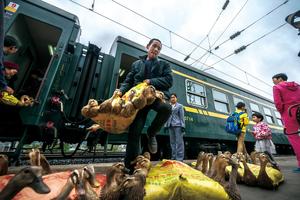 A villager carrying ducks gets off the No 5633 train in Liangshan Yi autonomous prefecture, Sichuan province, in June 2019. (SHEN DAN / FOR CHINA DAILY)
A villager carrying ducks gets off the No 5633 train in Liangshan Yi autonomous prefecture, Sichuan province, in June 2019. (SHEN DAN / FOR CHINA DAILY)
Charity chief praises country's efforts
By Li Lei
![]()
China has beaten absolute poverty at home a decade ahead of the UN deadline, and it has never forgotten those left behind, a Chinese charity leader said on Thursday.
The nation has met the UN 2030 Agenda for Sustainable Development 10 years ahead of schedule by helping almost 100 million rural residents escape poverty since late 2012, said Wang Xingzui, executive vice-president of the China Foundation for Poverty Alleviation, a humanitarian relief and development organization.
Meanwhile, China has fulfilled its "due international responsibility", he said at the Vision China virtual event.
"There is only one Earth, and only one shared future for humanity," Wang said, citing a speech that President Xi Jinping made at the World Economic Forum Virtual Event of the Davos Agenda in January.
"As we cope with the current crisis and endeavor to make a better day for everyone, we need to stand united and work together," he added.
In 2012, China launched a poverty-curbing campaign to boost rural incomes and make sure that the poor are properly fed and clothed and have access to compulsory education, basic healthcare and adequate housing.
Since then, the foundation has assisted 35 million rural poor, Wang said.
He used Xueshan village in Sichuan province as an example. Villagers from there now live in newly built homes with "sustainable livelihoods" thanks to the charity's financial support.
The village was one of about 128,000 nationwide that were labeled as impoverished.
Wang said the organization has also been an active participant in the drive for building a community with a shared future for mankind, a proposal put forward by Xi in 2015.
He said it has targeted six sustainable development goals-no poverty, no hunger, good health and well-being, quality education, clean water and sanitation, and decent work and economic growth-as it operates a number of development programs in Asia and Africa.
The programs collectively benefit more than 1.3 million people in 24 countries, figures from the foundation showed.
While speaking at the event, Wang shared stories of four of its signature overseas programs-the Smiling Children School Feeding Program, the Myanmar Paukpaw Scholarship Project, the Panda Pack Project and the Youth Vocational Training Program.
One was about Girma, a 13-year-old boy who came to Addis Ababa, the capital of Ethiopia, with his mother from the nation's eastern Somali region in 2018 after his father died.
That same year, the school where Girma has enrolled was selected for the Smiling Children School Feeding Program, which offers free breakfast and lunch for students.
"A full stomach and improved nutrition have resulted in beneficiary students concentrating better in class and showing better academic performance, contributing to the prevention of the intergenerational transmission of poverty," he said.
The CFPA has helped feed 66,361 children like Girma in Ethiopia, Sudan, Nepal, Myanmar and Pakistan, he noted.
Wang said such stories provide vivid illustrations on how people-to-people connectivity has deepened through community-based development programs.
China has accomplished the task of building a "moderately prosperous society in all aspects"-of which zero absolute poverty is a benchmark requirement-and embarked on a new journey toward the second centennial goal of building a modern socialist country.
As a responsible major country, China stands ready to share its theories and practices in poverty reduction with the rest of the world, Wang said.
He said that the foundation will continue implementing domestic development programs with nongovernmental resources to consolidate poverty reduction achievements and facilitate the national rural vitalization strategy.
It will also roll out new programs in other developing countries to meet the new challenges in global poverty governance and to build a world free of poverty.
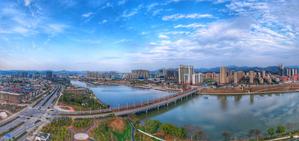 Panoramic views of Yueliangwan New District in Huichang county, Jiangxi province, now and years ago. (PHOTO PROVIDED TO CHINA DAILY)
Panoramic views of Yueliangwan New District in Huichang county, Jiangxi province, now and years ago. (PHOTO PROVIDED TO CHINA DAILY)
Lessons for Africa from successful campaign
By Hou Liqiang
![]()
China could inject impetus into Africa's development, not only via economic cooperation but also by sharing the experiences of its successful poverty relief campaign, an expert said on Thursday.
David Monyae, director of the Centre for Africa-China Studies at the University of Johannesburg in South Africa, made the remark in a video speech aired at the Vision China virtual event.
"With a similar fate in the past and a common mission, China and Africa have extended sympathy to and helped each other throughout the years. Together, we have embarked on a distinctive path of win-win cooperation," he said, quoting President Xi Jinping's address to the 2018 Beijing Summit of the Forum on China-Africa Cooperation.
Xi has made four visits to Africa in his capacity as president, and many others before acceding to the top leadership role, Monyae said."The frequency of his visits underscores the importance that he attaches to this continent," he said.
At the 2018 summit, China demonstrated its commitment to Africa by pledging US$60 billion in assistance, investments and loans. The funding, if wisely used, could "play a crucial role in addressing the formidable challenges that Africa has to meet", Monyae said.
The Belt and Road Initiative proposed by Xi in 2013 was "a far-reaching project" and "an ideational construction" that has fostered culture exchanges, enhanced economic growth and promoted connectivity, Monyae said.
Facets of the BRI are in tandem with the African Union's Agenda 2063, especially in regard to improving trade and people-to-people exchanges, he said.
"More importantly, Africa has so much to learn from China on how to uplift the majority of Africans from poverty," he noted.
Monyae said there is no doubt that China has emerged at a very rapid pace as one of the most critical players in the international arena.
"For Africa, in particular, this relationship is central, with China ranking highly among Africa's trade and investment partners, and with these figures growing by exponential rates at an average rate of 20 to 40 percent each year," he said.
President Xi recently declared that China had completely eradicated extreme poverty, an announcement that coincided with the 100th anniversary of the founding of the Communist Party of China.
The country's next major targets are to become a moderately developed economy by 2035 and realize net zero carbon emissions before 2060.
"Judging from its achievements in the last 40 years, there is little doubt that China will meet the set targets. The CPC has blazed a trail more than any other nation. Of most importance is its achievements inspire hope in the developing world," he said. "Indeed, the CPC has taken another Long March, this one toward prosperity and global acclaim."
He said prominence in world standings also comes with expectations of responsible global citizenship.
China should thus be poised to work with the developing countries that remain trapped in the circumstances that were characteristic of China from 1949 to 1978, in particular African nations.
"This, of course, does not spare Africa from being its own primary architect of the continent's development," he said.
"It is within this context that I and the rest of the African continent would like to take this opportunity to congratulate China and the Chinese for their hard-won poverty eradication programs that we are looking forward to."
He hoped African countries can emulate and work with China to achieve similar targets.
China Daily journalist chronicles anti-poverty work in new book
![]()
There has never been a better time to be alive. This is largely thanks to China's progress and especially its poverty alleviation efforts, particularly in recent years.
This was the message China Daily journalist and Chinese Government Friendship Award laureate Erik Nilsson emphasized at the recent Vision China event that explored the theme, "the way forward after beating poverty".
"Across virtually all metrics, across our planet, life has, on average, been getting better and doing so faster than we could have reasonably expected, even several years ago-and, arguably, than most of us realize today," said Nilsson, who has spent 15 years exploring poverty alleviation in remote areas in every provincial-level region on the Chinese mainland.
"China has been the main driver of global poverty alleviation. This truly embodies the spirit of a community of a shared destiny for mankind. I expect China's development will continue to accelerate to advance virtually every dimension of human well-being, not only within China but also the world."
The United States citizen said he has made it his "life's mission" to tell the story of China's poverty alleviation through journalism and especially through his new book, Closer to Heaven: A Global Nomad's Journey Through China's Poverty Alleviation, published by China Intercontinental Press in English and Chinese.
"I discover unexpected dimensions of China's poverty alleviation in quake zones, deserts, mountains and other often geologically hazardous areas throughout the country. Along the way, I saw such extreme human suffering and then saw it overcome as China improved the human condition on a miraculous scale," Nilsson said.
"I wrote the book as an 'adventure book' of firsthand accounts to show how China has achieved this miracle and what it had to overcome. I'm honored for the opportunity to engage with this topic at Vision China because it's an exceptional platform to gain deeper insights into the country's realities."
In 2011, Nilsson founded a volunteer initiative in Qinghai province's Yushu, starting with providing solar panels for schools in nomadic communities, following a 2010 quake that killed about 2,600 people.
He was happy to see that, during the recent two sessions, President Xi Jinping lauded Yushu's progress. Xi visited the area soon after the quake and has followed its progress since.
"After electrifying schools throughout Yushu's Qumarleb county, friends and I went on to bring metric tons of clothes, computer labs, libraries, food, medicine, coal and even yaks, when a blizzard killed most of a school's herd," Nilsson said.
"Even there, on the 'planet's third pole', China's poverty-alleviation miracle means that the Yushu I returned to recently is a different place from what I first saw in 2011. Since China has by now provided the so-called hardware, like electricity, our volunteer initiative has shifted focus to providing full university scholarships for underprivileged nomads and surgeries for children with disabilities on the plateau."
Nilsson points out that, while the country's poverty alleviation miracle is multifaceted, a primary point is that the leadership has sustained it as a primary concern.
"Even though China abandoned GDP targets last year during the COVID pandemic, it remained true to its goal of totally eliminating extreme poverty," he said. "That's a powerful testimony."
And it is one with global consequences, he said.
"We are, as a planet, as a species, moving closer to heaven on Earth every moment-including this very instant, as China's progress, helmed by the Communist Party of China led by General Secretary Xi, in turn, drives global progress," Nilsson said.
"What a time to be alive! The best of times, in fact."


